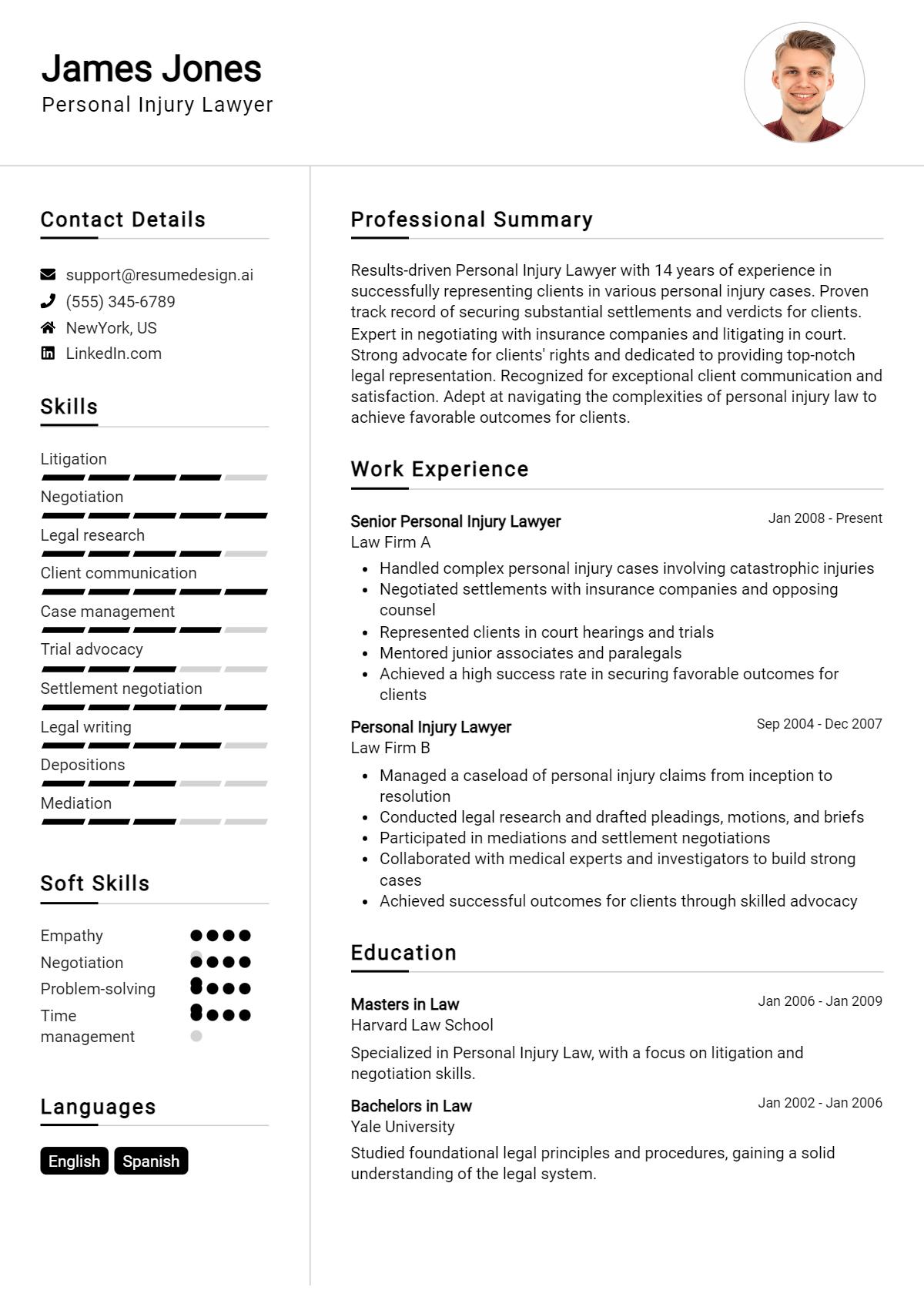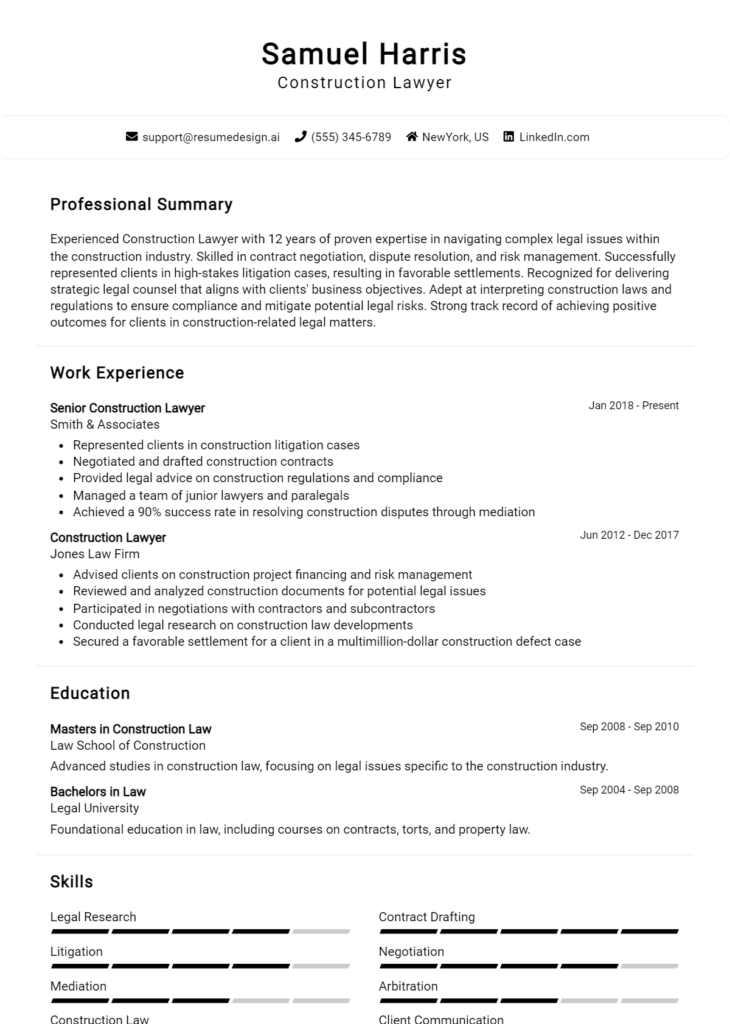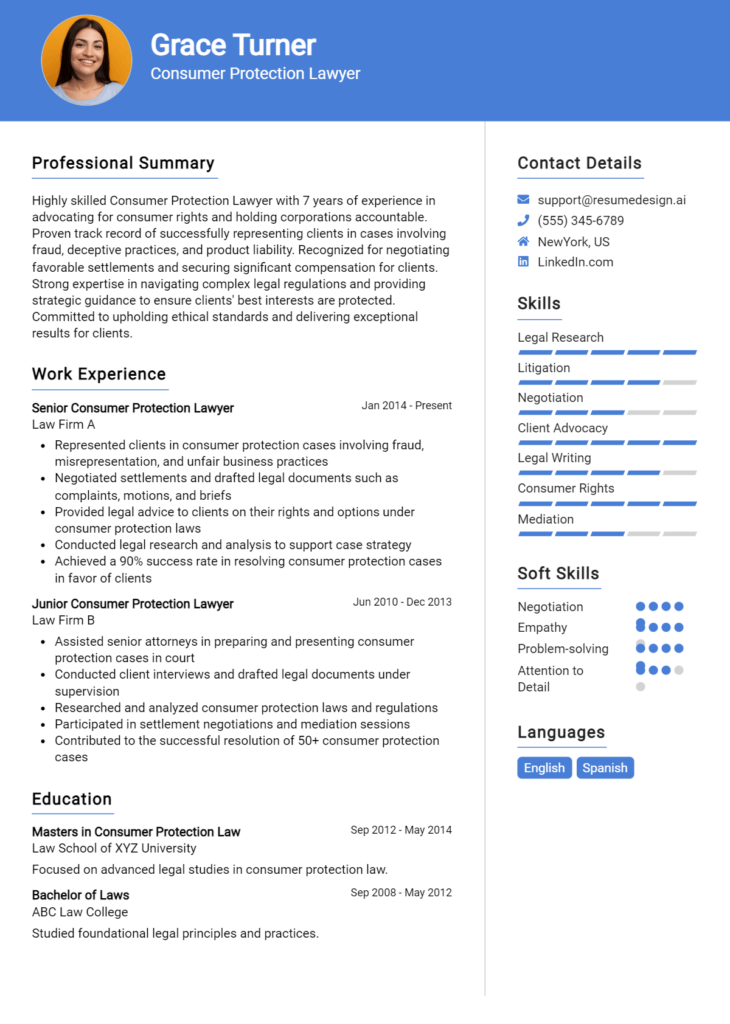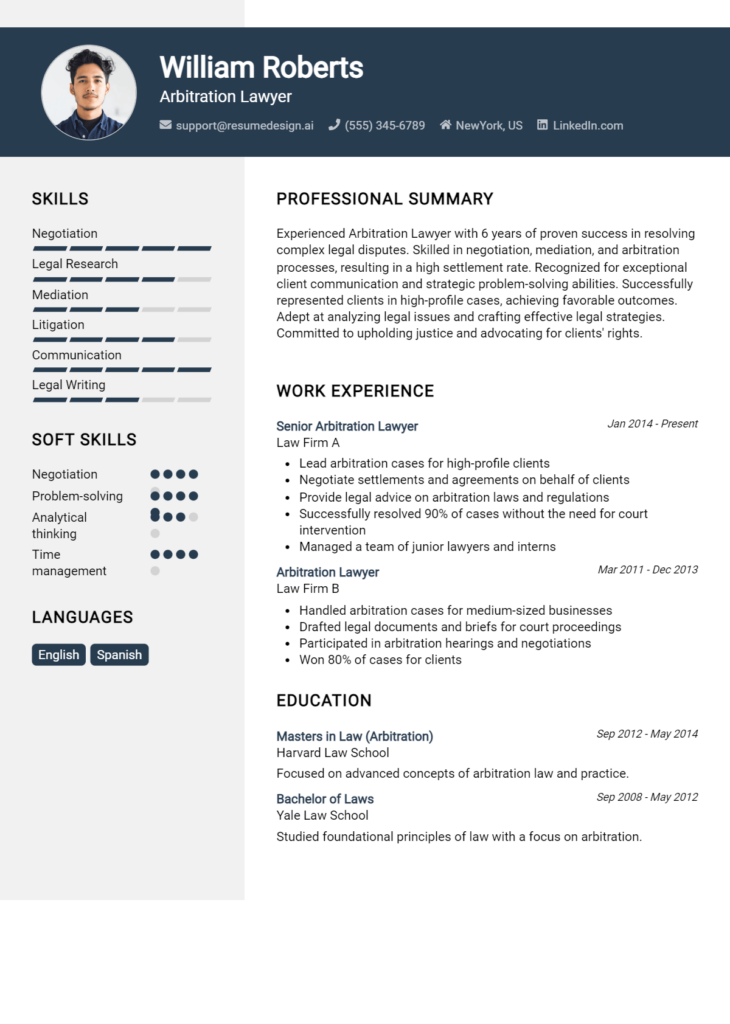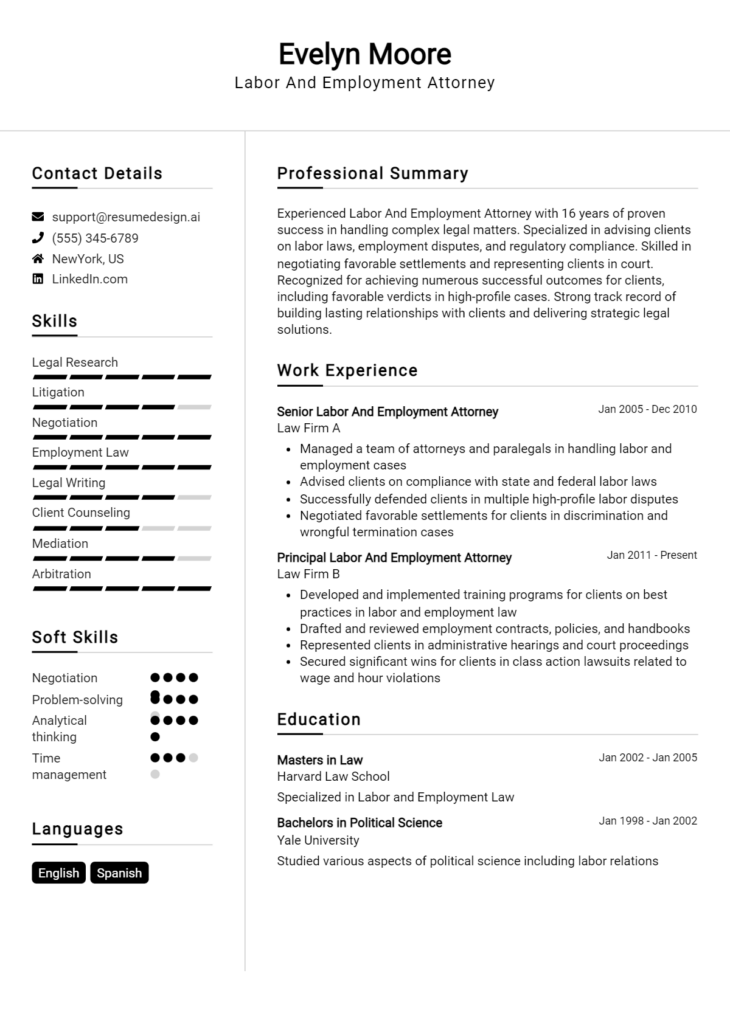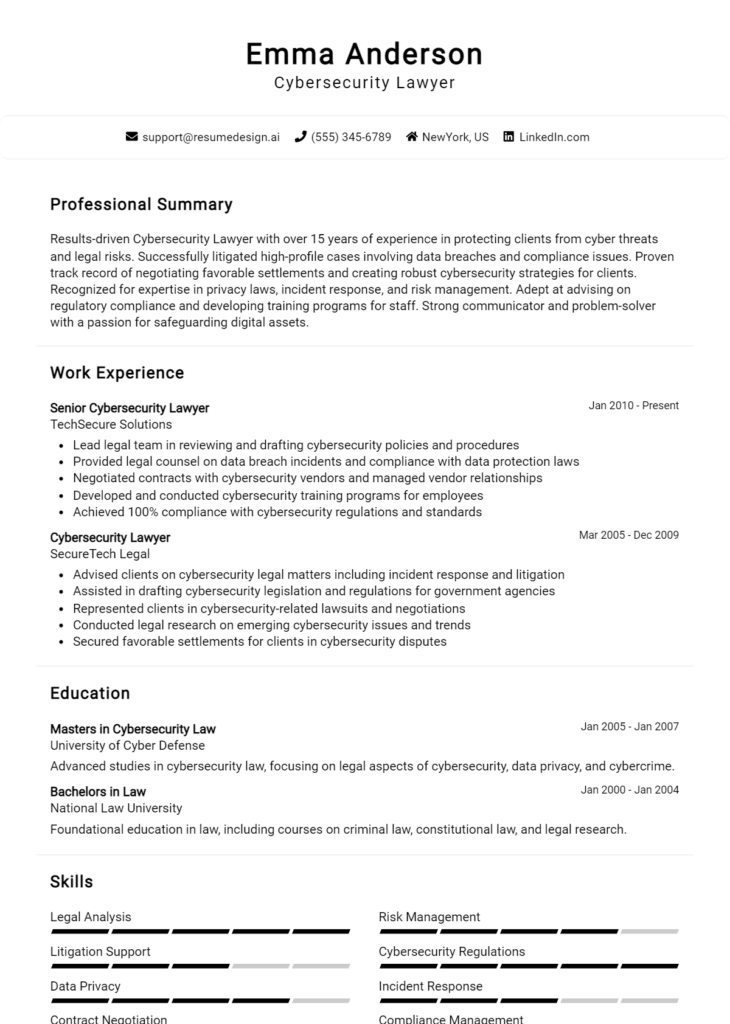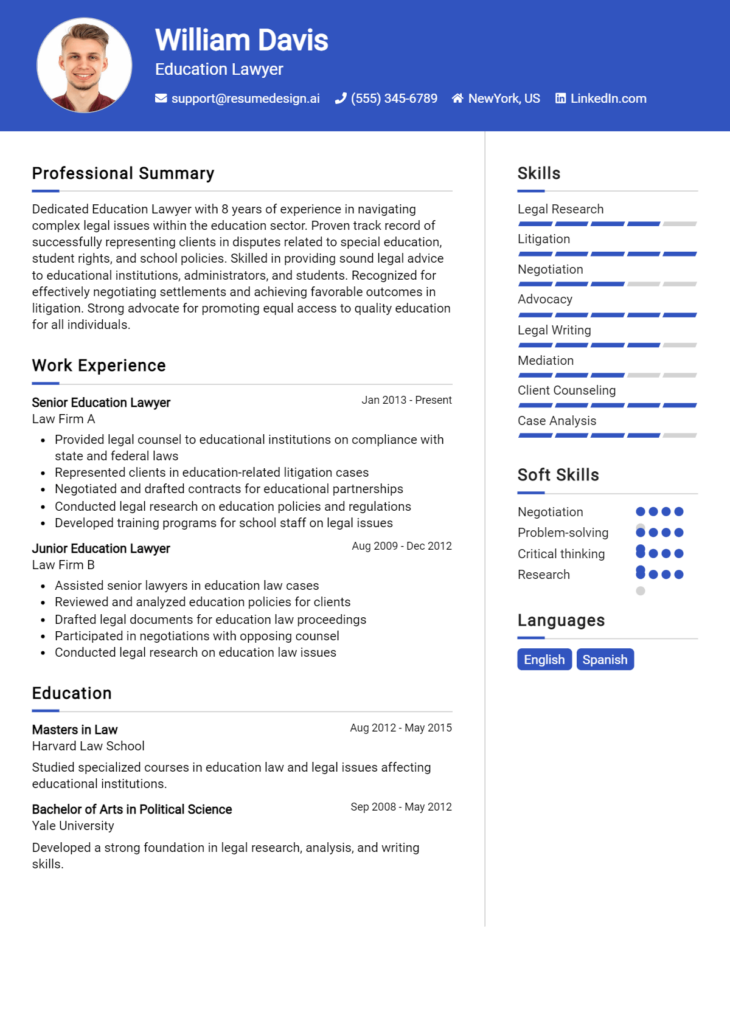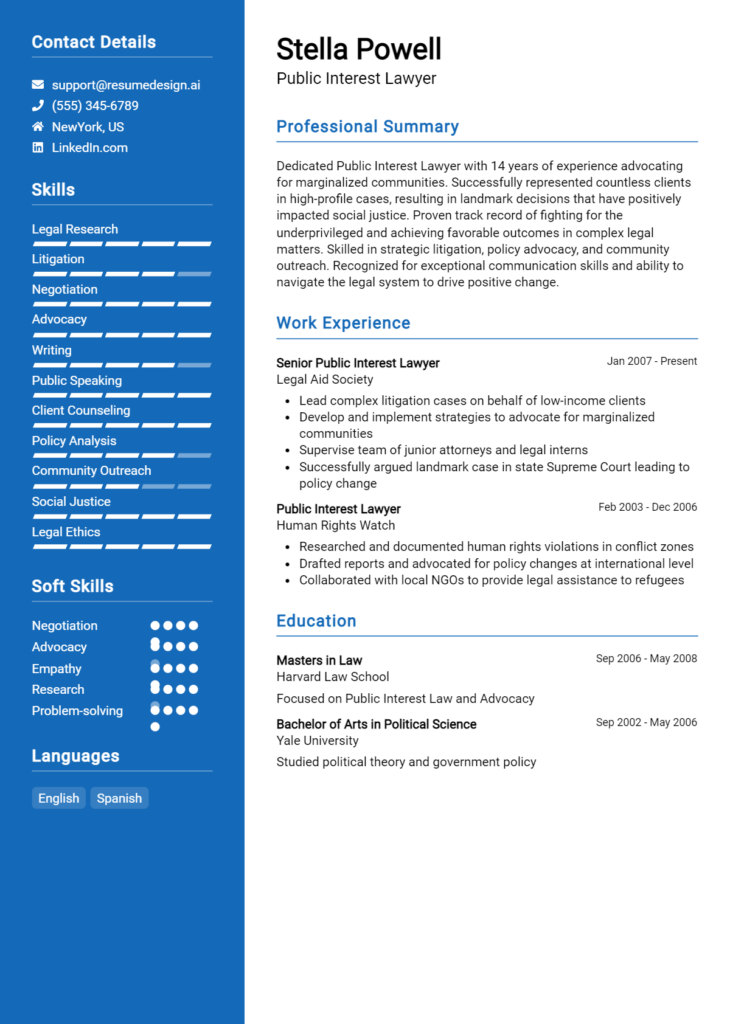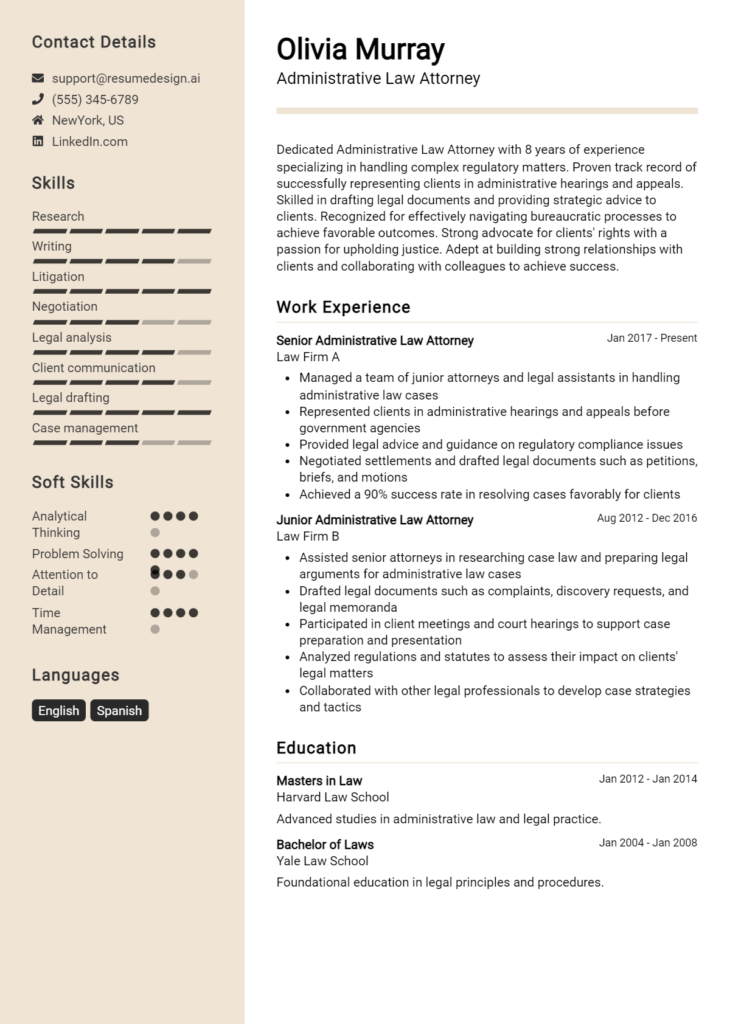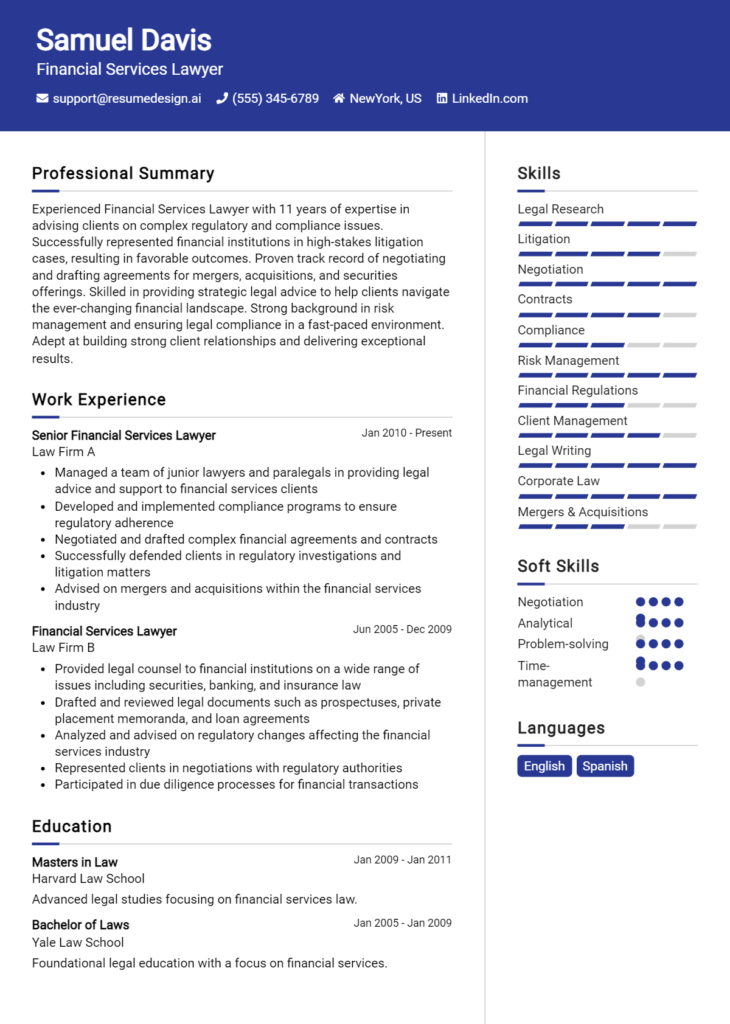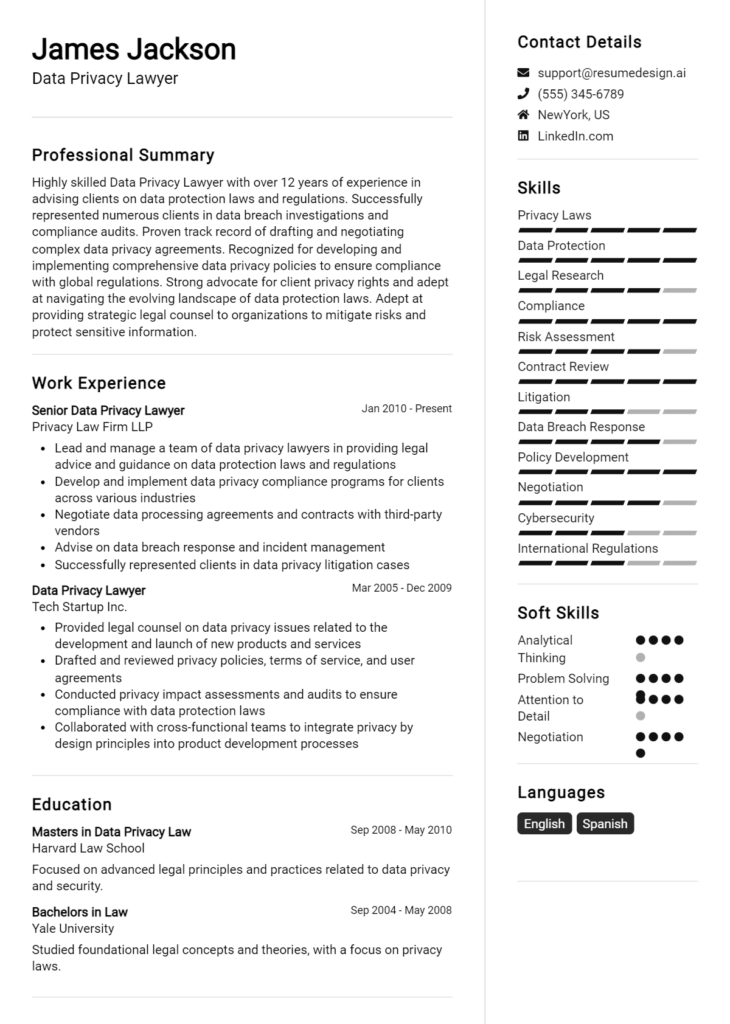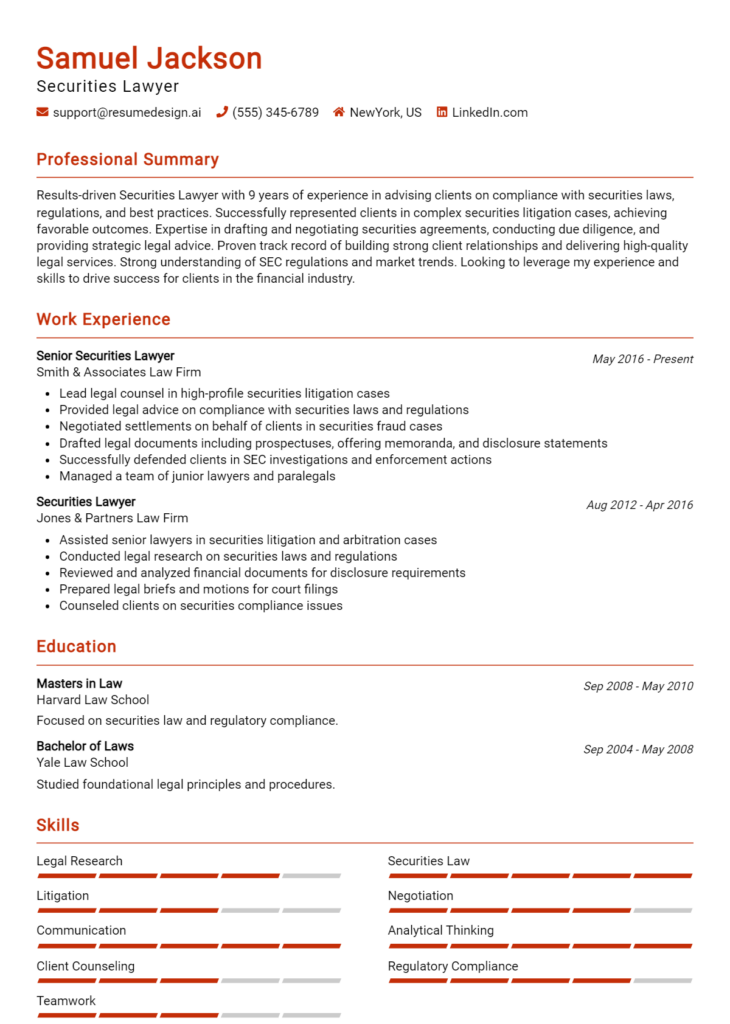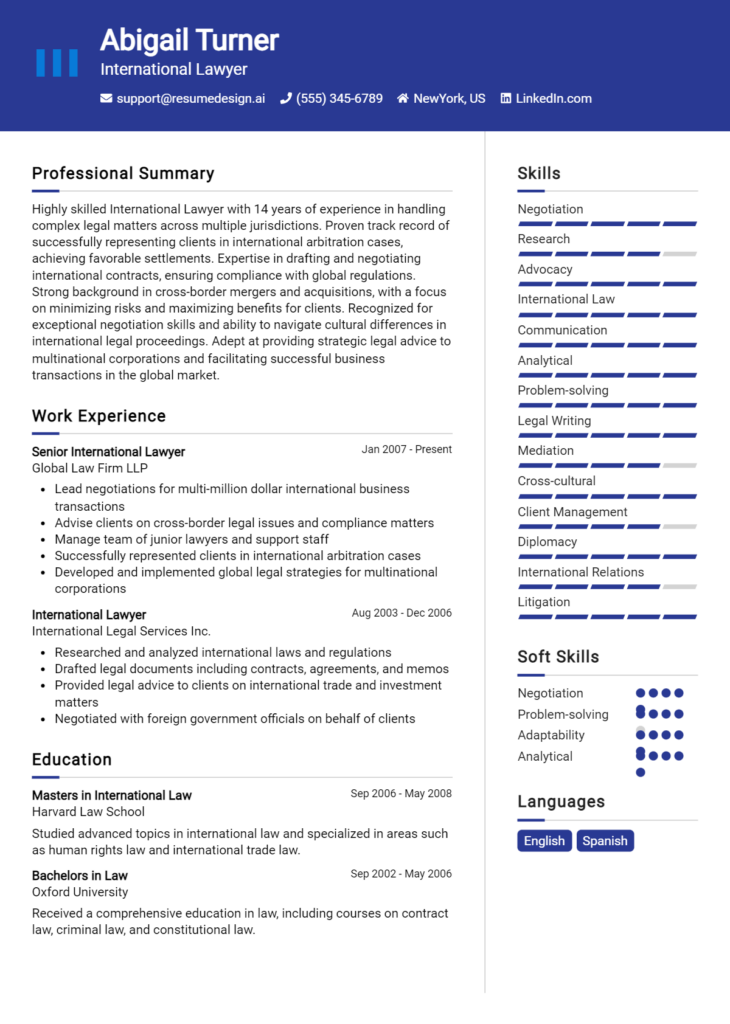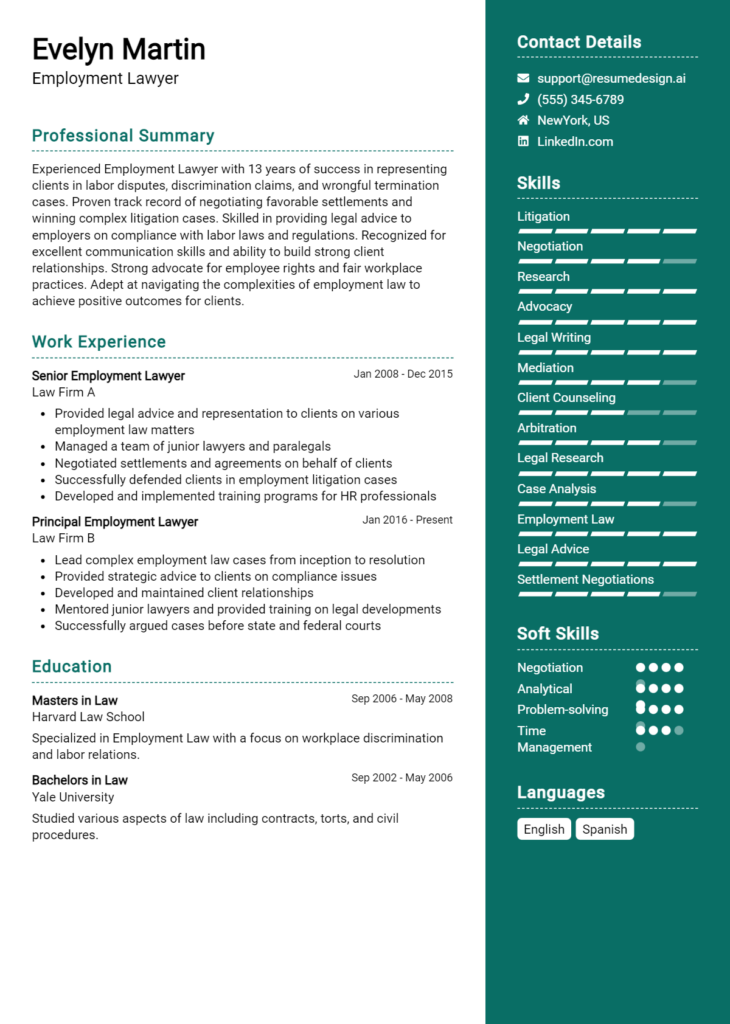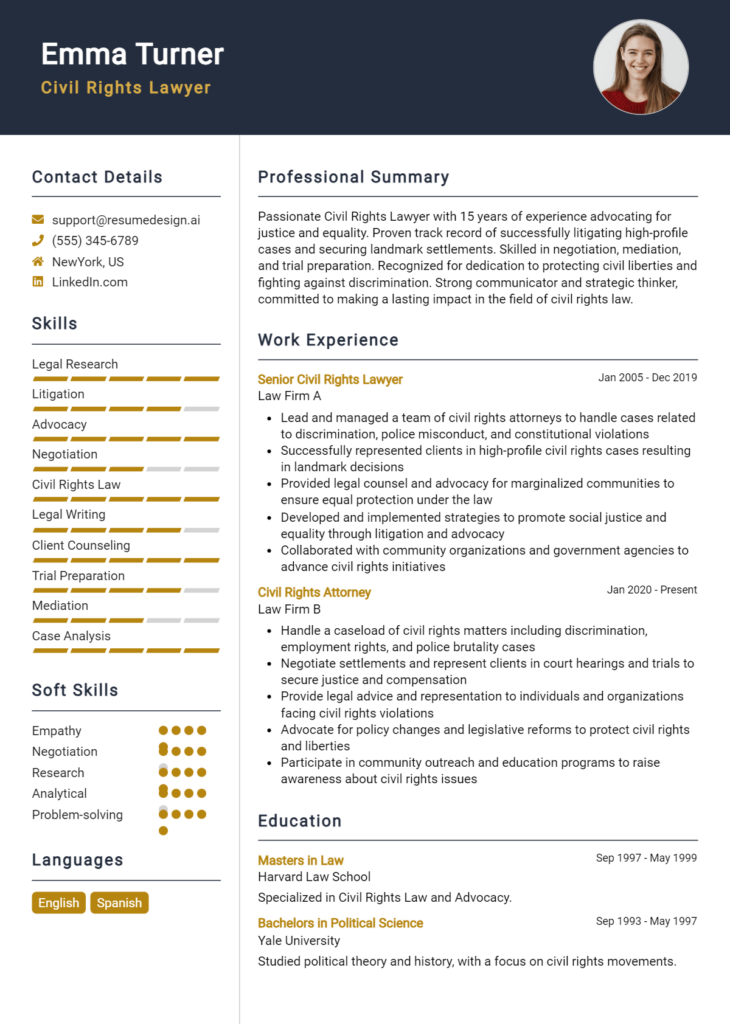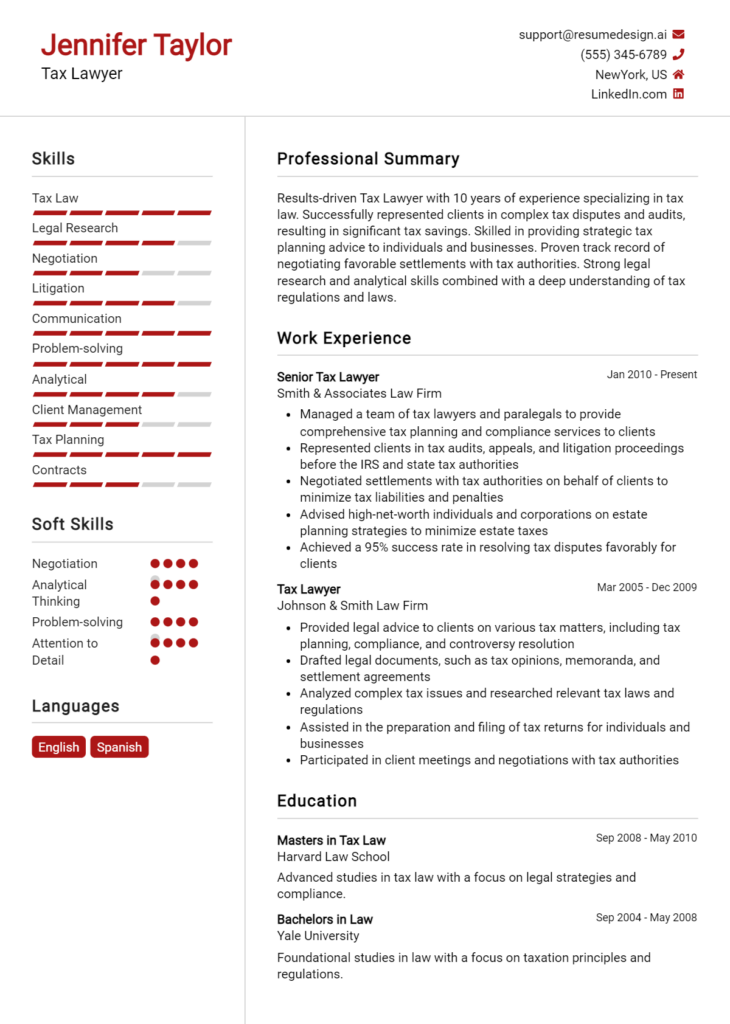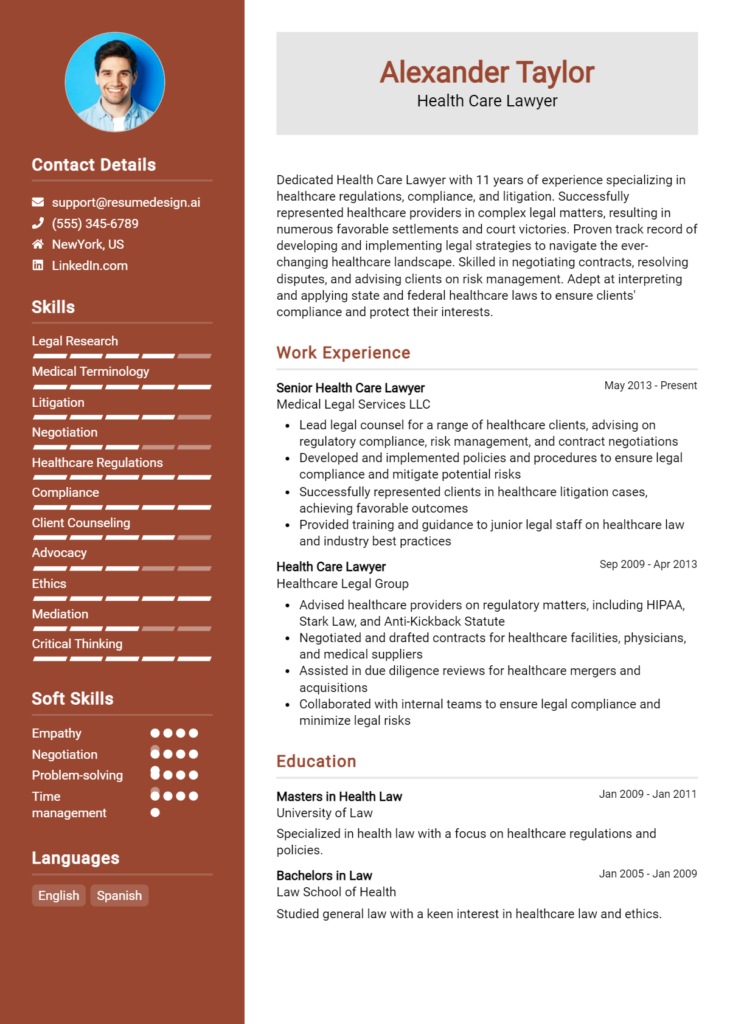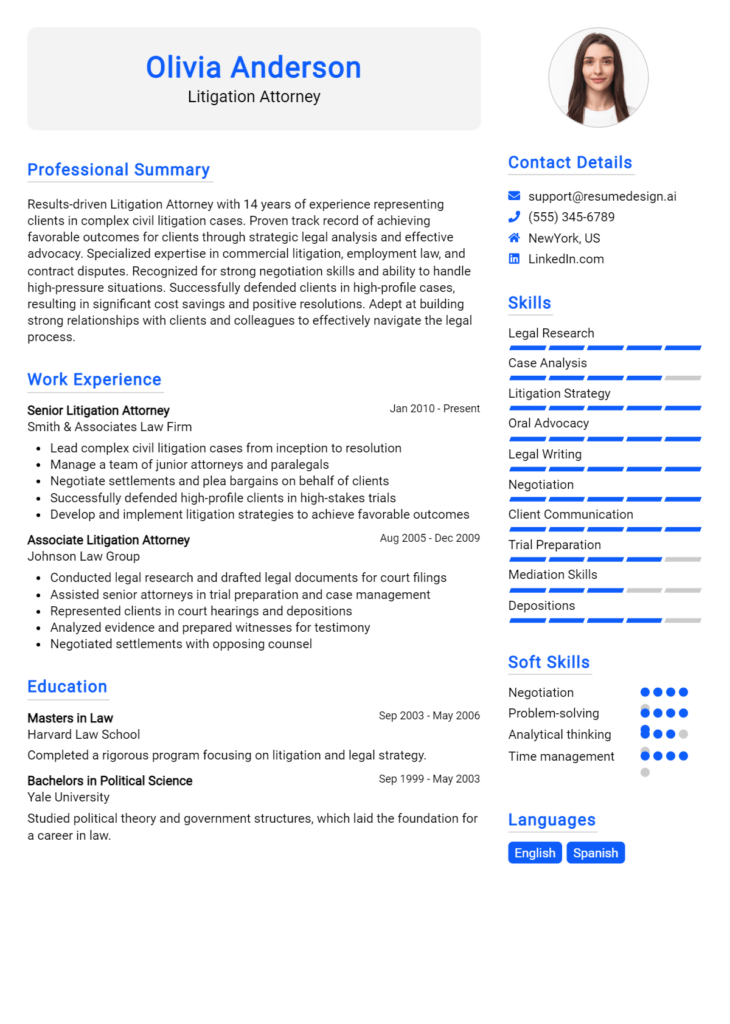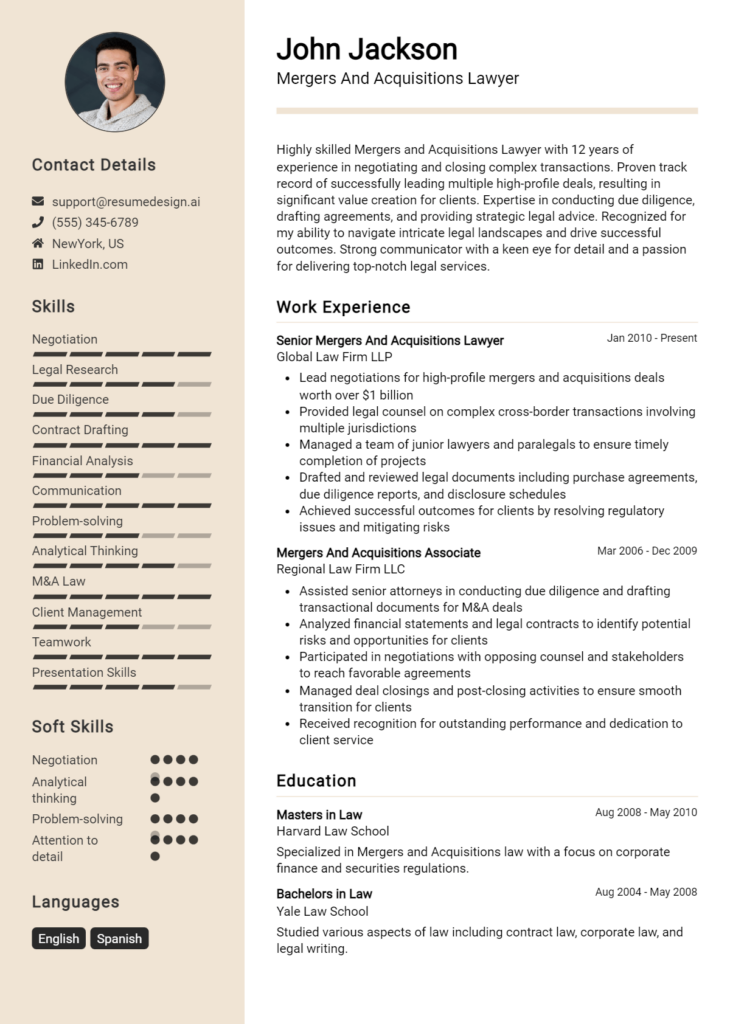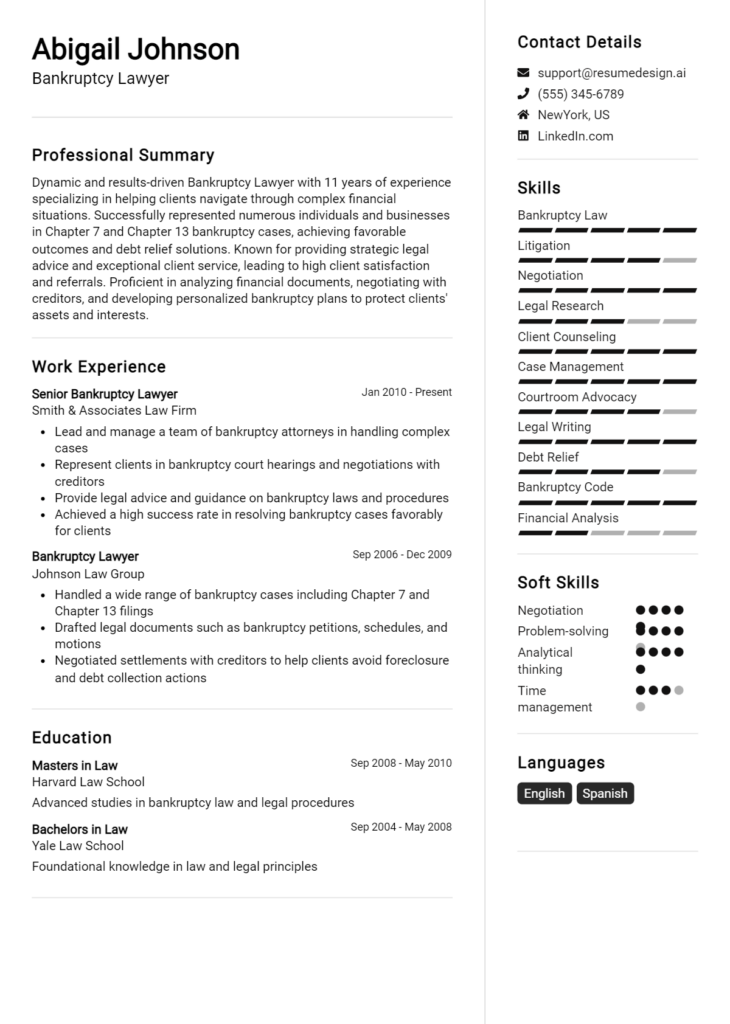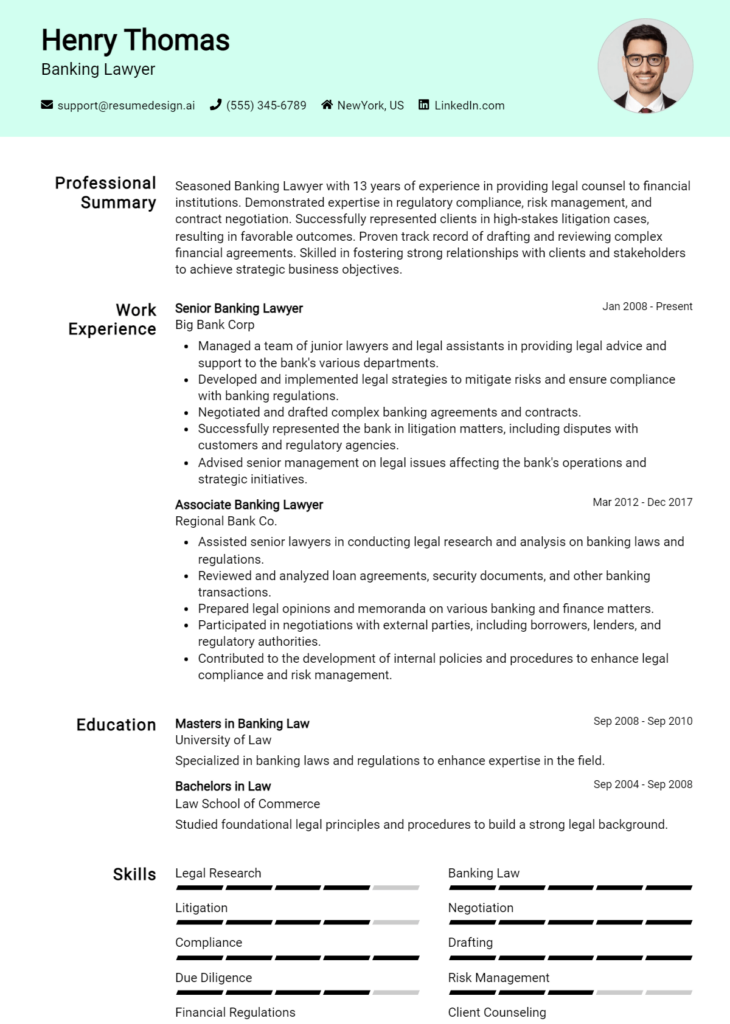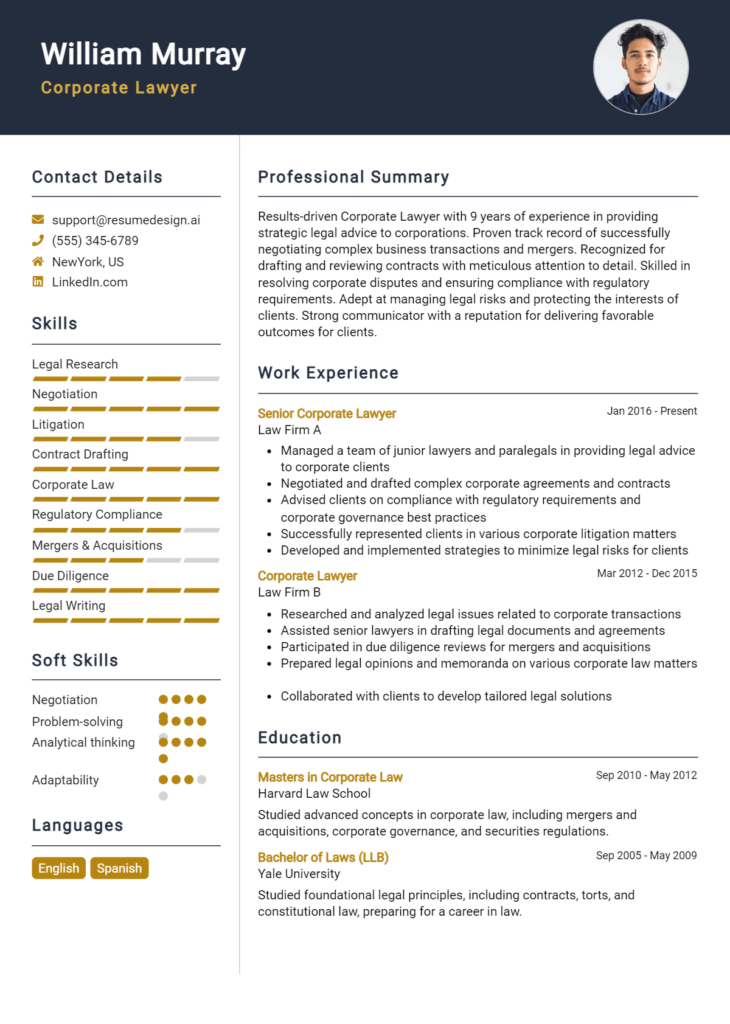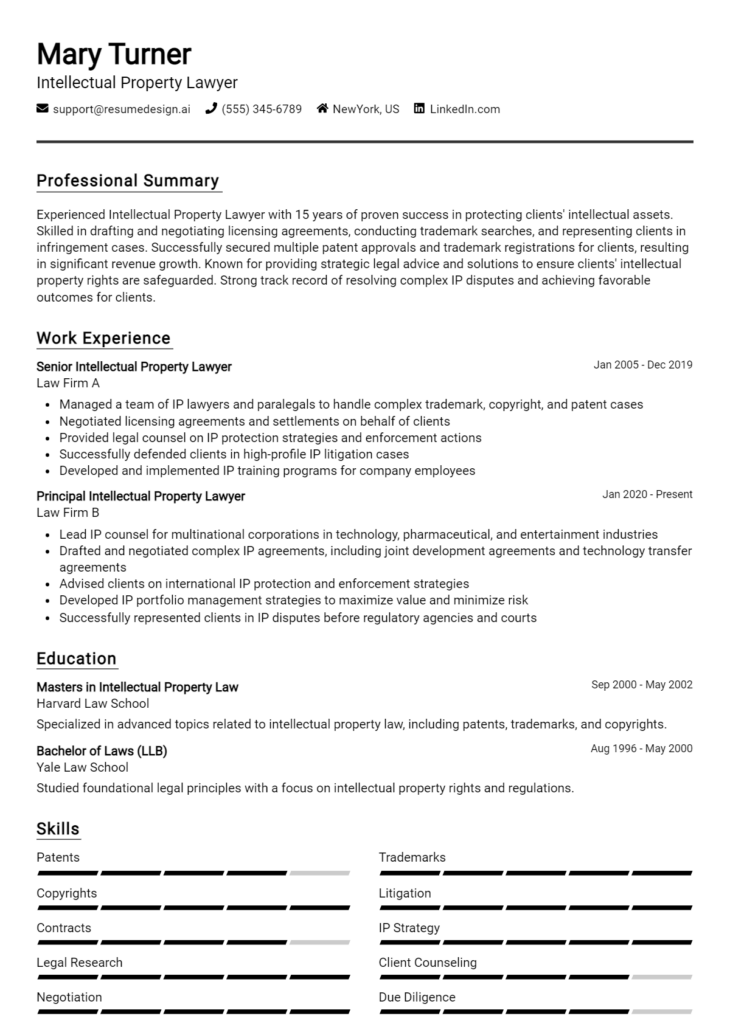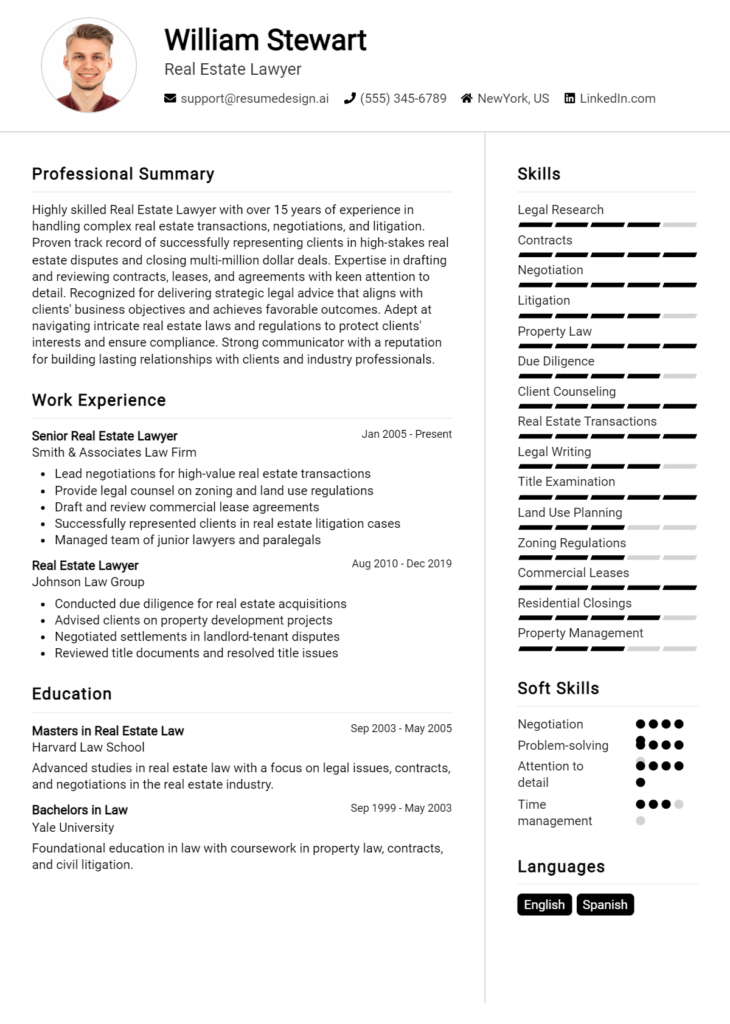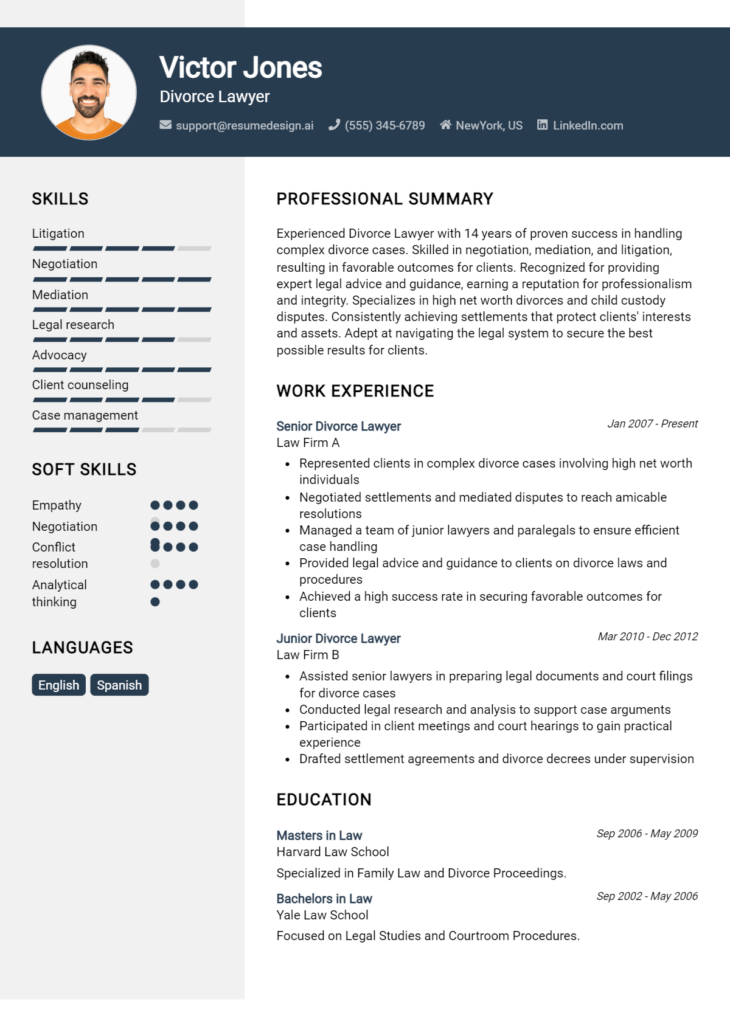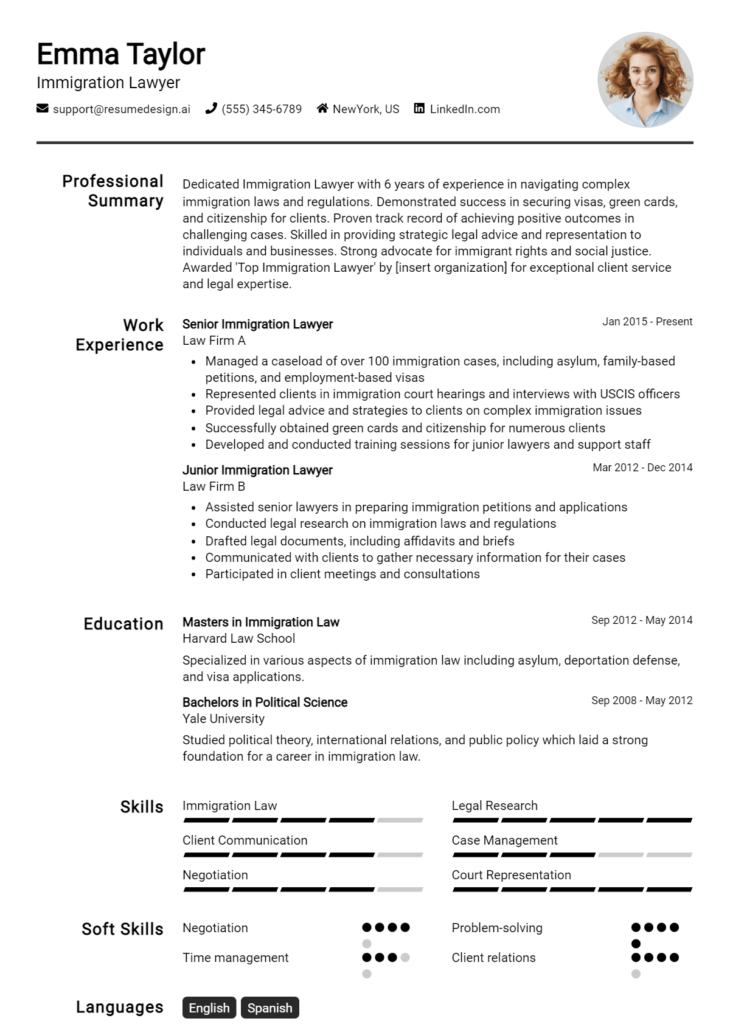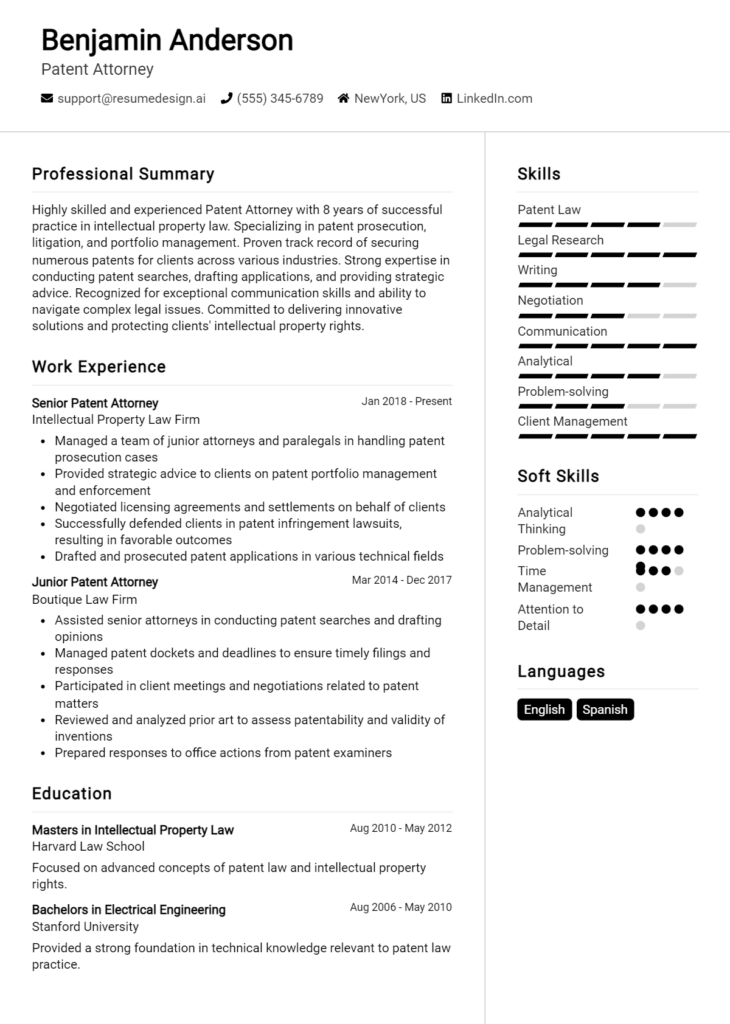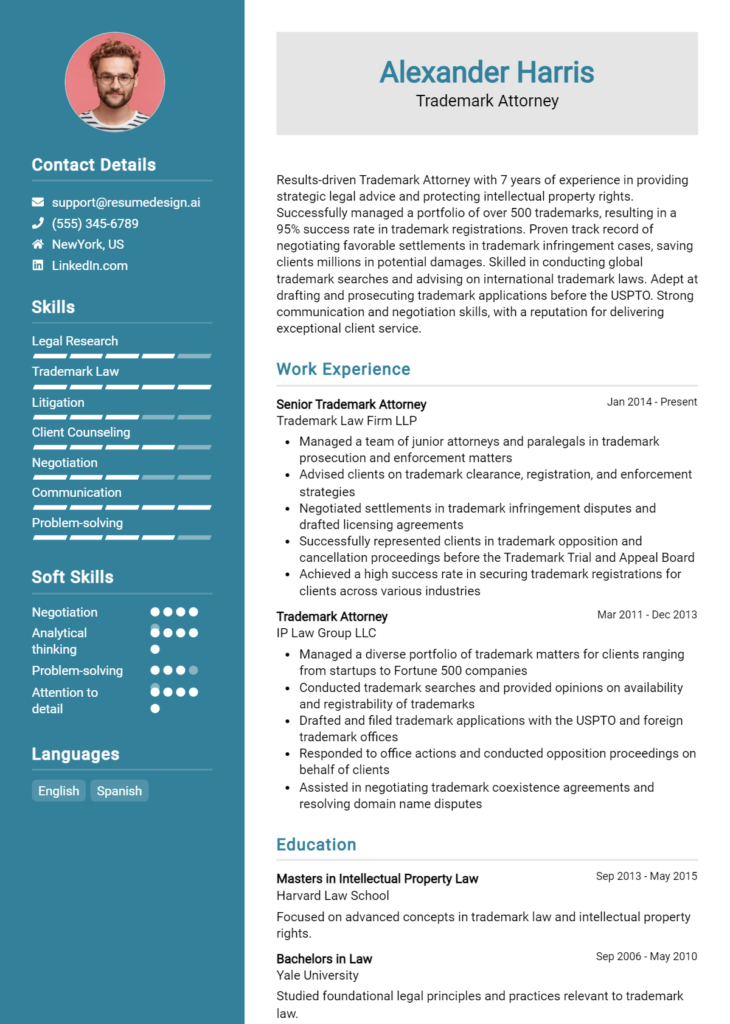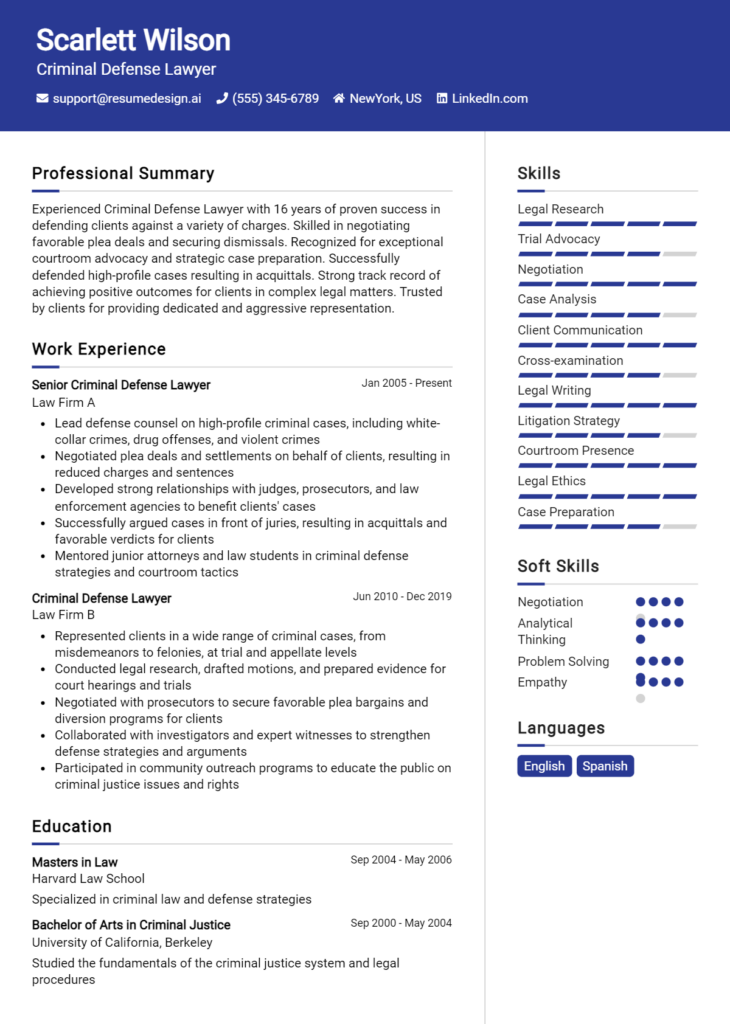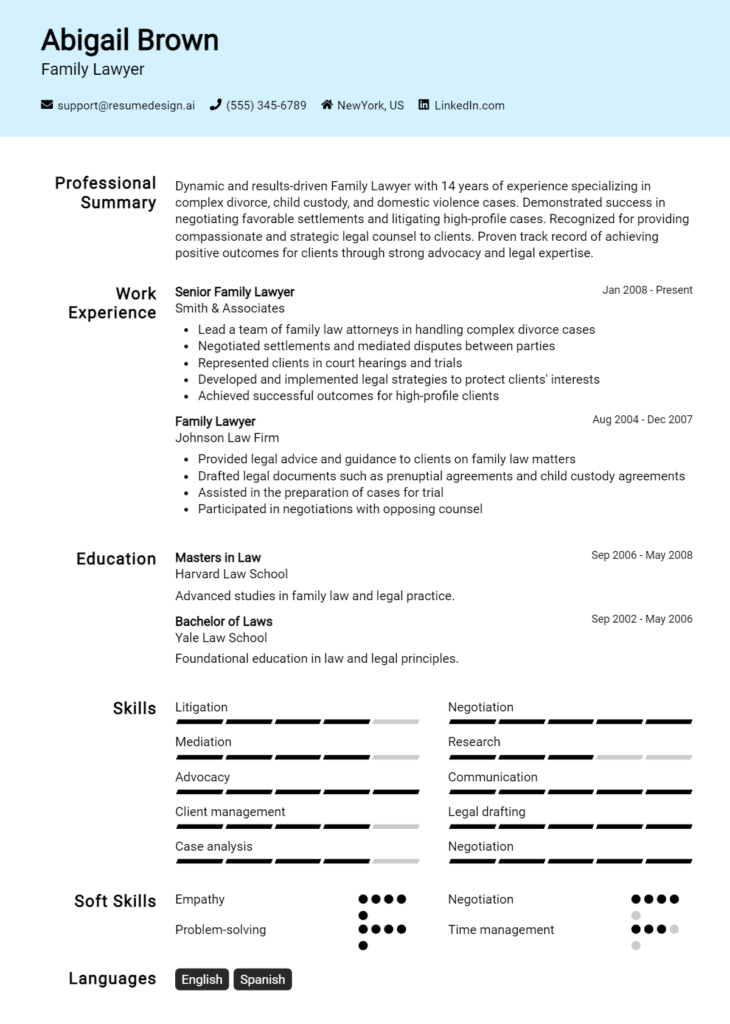Personal Injury Lawyer Core Responsibilities
A Personal Injury Lawyer is responsible for representing clients who have suffered harm due to the negligence of others. Key responsibilities include conducting thorough investigations, negotiating settlements, and preparing legal documents. They must possess strong analytical and problem-solving skills to assess cases effectively and develop strategies. This role often requires collaboration with medical professionals and insurance companies, bridging various departments to achieve client goals. A well-structured resume that highlights these technical and operational skills is essential for showcasing qualifications and contributing to organizational success.
Common Responsibilities Listed on Personal Injury Lawyer Resume
- Conducting detailed case evaluations and client consultations.
- Gathering and analyzing evidence to support claims.
- Negotiating settlements with insurance adjusters.
- Preparing and filing legal documents, including complaints and briefs.
- Representing clients in court hearings and trials.
- Staying updated on personal injury laws and regulations.
- Collaborating with medical experts to substantiate claims.
- Managing case files and maintaining accurate records.
- Advising clients on legal options and potential outcomes.
- Developing case strategies tailored to individual circumstances.
- Communicating effectively with clients throughout the legal process.
- Participating in legal research to strengthen cases.
High-Level Resume Tips for Personal Injury Lawyer Professionals
A well-crafted resume is crucial for Personal Injury Lawyer professionals as it serves as the first introduction to potential employers. In a competitive field where every detail counts, your resume must not only highlight your legal expertise but also reflect your unique achievements and skills. It is your opportunity to make a compelling case for your candidacy, showcasing your understanding of personal injury law, courtroom experience, and client advocacy. This guide will provide practical and actionable resume tips specifically tailored for Personal Injury Lawyer professionals, helping you stand out in a crowded job market.
Top Resume Tips for Personal Injury Lawyer Professionals
- Tailor your resume to the specific job description by using keywords and phrases that align with the employer's needs.
- Highlight relevant experience by focusing on your work in personal injury cases, including any specific areas of specialization.
- Quantify your achievements by including statistics, such as the number of cases won or the total settlement amounts secured for clients.
- Showcase industry-specific skills, such as negotiation, litigation, and client relations, to demonstrate your competence in the field.
- Include any relevant certifications or memberships in professional organizations, which can enhance your credibility as a Personal Injury Lawyer.
- Utilize a clear and professional format, ensuring that your resume is easy to read and visually appealing.
- Incorporate a strong summary statement at the beginning of your resume that encapsulates your experience and career goals.
- List any notable continuing education or training that reflects your commitment to staying updated on personal injury law.
- Proofread for grammatical errors and typos, as attention to detail is critical in the legal profession.
Implementing these tips can significantly increase your chances of landing a job in the Personal Injury Lawyer field. A resume that effectively showcases your skills and accomplishments will not only attract the attention of hiring managers but also demonstrate your dedication to the profession, ultimately leading to more interview opportunities and career advancement.
Why Resume Headlines & Titles are Important for Personal Injury Lawyer
In the competitive landscape of personal injury law, a well-crafted resume headline or title serves as the first impression a candidate makes on hiring managers. It is crucial for summarizing a candidate's key qualifications and areas of expertise in a concise yet impactful manner. A strong headline can immediately grab attention, helping to differentiate a candidate from the sea of resumes that typically flood legal job postings. By being relevant and directly related to the job being applied for, the headline sets the tone for the rest of the resume, encouraging hiring managers to delve deeper into the applicant’s qualifications.
Best Practices for Crafting Resume Headlines for Personal Injury Lawyer
- Keep it concise: Aim for a headline that is brief yet informative, ideally within 10-12 words.
- Be role-specific: Tailor the headline to reflect the specific position or area of expertise within personal injury law.
- Highlight key strengths: Use powerful language to showcase your most relevant skills or achievements.
- Use industry keywords: Incorporate terms and phrases that are commonly used in personal injury law to pass ATS filters.
- Avoid generic phrases: Steer clear of vague titles like "Lawyer" or "Attorney"; instead, specify your niche.
- Showcase experience level: Indicate your years of experience or notable positions held in the field.
- Make it impactful: Use action words or results-oriented phrases to convey a sense of accomplishment.
Example Resume Headlines for Personal Injury Lawyer
Strong Resume Headlines
"Experienced Personal Injury Attorney with a Proven Track Record of Winning Cases"
“Compassionate Advocate Specializing in Catastrophic Injury Claims”
“Dedicated Personal Injury Lawyer with Over 10 Years of Successful Litigation”
Weak Resume Headlines
“Lawyer Seeking Job”
“Legal Professional with Experience”
The strong headlines are effective because they immediately convey the candidate's unique qualifications and relevant experience, making them stand out to hiring managers. They utilize specific language that captures the essence of the candidate's expertise in personal injury law. In contrast, the weak headlines fail to impress due to their vagueness and lack of specificity, making it difficult for hiring managers to grasp the candidate's qualifications at a glance. A strong headline not only piques interest but also invites further examination of the resume, while weak headlines often lead to quick dismissal.
Writing an Exceptional Personal Injury Lawyer Resume Summary
A well-crafted resume summary is crucial for a Personal Injury Lawyer, as it serves as the first impression a hiring manager has of a candidate's qualifications. In a competitive field where attention to detail and effective communication are paramount, a strong summary quickly captures the attention of employers by showcasing key skills, relevant experience, and notable accomplishments. It should be concise yet impactful, providing a snapshot of the candidate's professional journey while being tailored specifically to the job description. A powerful summary can distinguish a candidate from others and set the tone for the rest of the resume.
Best Practices for Writing a Personal Injury Lawyer Resume Summary
- Quantify Achievements: Use specific numbers or percentages to highlight successes, such as the amount of compensation secured for clients.
- Focus on Relevant Skills: Emphasize skills that are particularly relevant to personal injury law, such as negotiation, litigation, and client advocacy.
- Tailor the Summary: Customize the summary for each job application to align with the specific requirements and language of the job description.
- Be Concise: Keep the summary brief, ideally 3-4 sentences, to maintain the reader's attention.
- Highlight Legal Expertise: Mention specific areas of personal injury law you specialize in, such as medical malpractice or workplace injuries.
- Showcase Client-Centric Approach: Emphasize your commitment to client service and successful case outcomes.
- Incorporate Action Words: Use strong verbs to convey confidence and assertiveness, such as "negotiated," "secured," and "achieved."
- Include Professional Credentials: Mention relevant certifications, licenses, or memberships in professional organizations to bolster credibility.
Example Personal Injury Lawyer Resume Summaries
Strong Resume Summaries
Dedicated Personal Injury Lawyer with over 7 years of experience securing client settlements exceeding $10 million. Proven track record in negotiating favorable outcomes in complex litigation cases, including medical malpractice and wrongful death claims. Committed to delivering exceptional client service and advocacy.
Results-oriented Personal Injury Attorney with a history of winning 95% of trial cases. Successfully represented over 200 clients in personal injury claims, achieving settlements averaging 150% of initial offers. Strong negotiation skills and deep understanding of insurance law.
Compassionate Personal Injury Lawyer known for a client-first approach, demonstrated by a 4.9/5 client satisfaction rating. Expertise in navigating high-stakes cases, leading to a 30% increase in settlements year-over-year. Licensed in multiple states with membership in the American Bar Association.
Weak Resume Summaries
Experienced lawyer looking for new opportunities in personal injury law.
I am a dedicated attorney with a strong background in legal matters and client representation.
The strong resume summaries are effective because they include quantifiable achievements, specific legal skills, and a clear connection to the requirements of the Personal Injury Lawyer role. They present concrete examples of success and demonstrate a commitment to client advocacy. In contrast, the weak summaries lack details, fail to convey relevant experience or outcomes, and come across as generic and unremarkable, making them less compelling to hiring managers.
Work Experience Section for Personal Injury Lawyer Resume
The work experience section of a Personal Injury Lawyer resume is vital in demonstrating a candidate's professional journey and expertise in the field. This section not only highlights the technical skills acquired through previous roles but also showcases the candidate's ability to manage teams effectively and deliver high-quality legal services. By quantifying achievements, such as case wins or settlements, and aligning experiences with industry standards, candidates can provide compelling evidence of their capabilities and commitment to client advocacy.
Best Practices for Personal Injury Lawyer Work Experience
- Use action verbs to describe responsibilities and achievements, emphasizing leadership and initiative.
- Quantify results by including statistics, such as the number of cases won or the total amount of settlements secured.
- Highlight specific technical skills relevant to personal injury law, such as negotiation, litigation, and case analysis.
- Showcase collaboration by detailing teamwork experiences with other lawyers, paralegals, and clients.
- Tailor your work experience to align with the job description of the position you are applying for.
- Include continuing education or certifications that enhance your legal expertise in personal injury law.
- Emphasize client outcomes and their satisfaction to demonstrate your effectiveness as a lawyer.
- Keep descriptions concise yet informative, allowing for easy scanning by hiring managers.
Example Work Experiences for Personal Injury Lawyer
Strong Experiences
- Successfully secured a $2 million settlement for a client in a complex auto accident case, demonstrating exceptional negotiation skills and legal acumen.
- Managed a team of 5 legal assistants and paralegals, improving case preparation efficiency by 30% through streamlined processes.
- Litigated over 100 personal injury cases, achieving a win rate of 85%, significantly above the industry average.
- Collaborated with medical experts to strengthen case arguments, resulting in a 50% increase in favorable verdicts in trial cases.
Weak Experiences
- Worked on various personal injury cases without specific details on outcomes or responsibilities.
- Assisted in case preparations occasionally, with no quantifiable results or contributions noted.
- Engaged in general legal work, lacking focus on personal injury law or relevant skills.
- Participated in team meetings without outlining any specific roles or impacts made during discussions.
The examples categorized as strong demonstrate clear, quantifiable achievements and specific roles that reflect the candidate's capabilities in personal injury law. They highlight measurable outcomes, responsibilities, and collaborations that showcase the candidate's effectiveness and leadership. In contrast, the weak experiences lack detail, quantifiable results, and a clear indication of the candidate's contributions, making them less impactful and informative for potential employers.
Education and Certifications Section for Personal Injury Lawyer Resume
The education and certifications section of a Personal Injury Lawyer resume is crucial for showcasing the candidate's academic qualifications, industry-specific credentials, and commitment to ongoing professional development. This section not only reflects the foundational legal education and specialized training that a personal injury lawyer possesses but also highlights their dedication to staying current with industry standards and practices. By including relevant coursework, certifications, and any specialized training, candidates can significantly enhance their credibility and demonstrate their alignment with the requirements of the job role.
Best Practices for Personal Injury Lawyer Education and Certifications
- Prioritize relevant degrees, such as a Juris Doctor (JD) from an accredited law school.
- Include any additional certifications related to personal injury law, such as Certified Trial Lawyer or similar credentials.
- List specialized training programs or workshops that focus on negotiation, mediation, or trial advocacy.
- Provide details on coursework that pertains specifically to tort law, ethics, and litigation.
- Highlight any continuing legal education (CLE) courses you have completed that are relevant to personal injury practice.
- Ensure that the format is clear and easy to read, using bullet points for clarity.
- Update the section regularly to reflect any new qualifications or certifications obtained.
- Use precise language to describe your qualifications to ensure they stand out to hiring managers.
Example Education and Certifications for Personal Injury Lawyer
Strong Examples
- Juris Doctor (JD), Harvard Law School, 2015
- Certified Trial Lawyer, National Board of Trial Advocacy, 2019
- Coursework in Tort Law, Ethics, and Personal Injury Litigation, University of California, Berkeley
- Continuing Legal Education (CLE) in Mediation Techniques for Personal Injury Cases, 2022
Weak Examples
- Bachelor of Arts in History, State University, 2008
- Real Estate License, State Real Estate Board, 2020
- Certificate in Basic Computer Skills, Local Community College, 2015
- High School Diploma, Anytown High School, 2004
The strong examples are considered relevant as they pertain directly to the practice of personal injury law, showcasing advanced qualifications and specialized training that enhance the candidate's expertise in the field. Conversely, the weak examples lack relevance to personal injury law, featuring qualifications that do not contribute meaningfully to the candidate's ability to excel in this specific legal area. This distinction highlights the importance of aligning educational and certification achievements with the specific requirements of the role.
Top Skills & Keywords for Personal Injury Lawyer Resume
In the competitive field of personal injury law, a well-crafted resume can make a significant difference in securing a position. Highlighting relevant skills is crucial, as they demonstrate a lawyer's ability to navigate complex legal matters, negotiate effectively, and advocate passionately for their clients. Potential employers look for a combination of hard and soft skills that showcase not only legal expertise but also interpersonal abilities that are vital for building client relationships and negotiating settlements. A strong resume will reflect both these skill sets, making it essential for personal injury lawyers to clearly articulate their strengths.
Top Hard & Soft Skills for Personal Injury Lawyer
Soft Skills
- Empathy
- Communication
- Negotiation
- Critical Thinking
- Problem Solving
- Time Management
- Attention to Detail
- Persuasiveness
- Interpersonal Skills
- Client Relationship Management
Hard Skills
- Legal Research
- Case Management
- Knowledge of Personal Injury Law
- Trial Preparation
- Litigation
- Evidence Analysis
- Document Drafting
- Settlement Negotiation
- Medical Terminology
- Familiarity with Legal Software
For more information on how to effectively showcase your skills and work experience, consider refining your resume to highlight these essential attributes.
Stand Out with a Winning Personal Injury Lawyer Cover Letter
Dear [Hiring Manager's Name],
I am writing to express my interest in the Personal Injury Lawyer position at [Law Firm's Name] as advertised on [where you found the job listing]. With over [X years] of experience in personal injury law, I have developed a strong track record of advocating for clients who have suffered due to the negligence of others. My commitment to delivering justice and fair compensation has not only resulted in successful outcomes for my clients but has also earned me a reputation as a compassionate and dedicated attorney in the field.
Throughout my career, I have successfully handled a diverse range of personal injury cases, from automobile accidents to medical malpractice claims. My approach emphasizes thorough investigation and comprehensive case preparation, which I believe are pivotal in building a compelling argument in favor of my clients. I take pride in my ability to negotiate effectively with insurance companies and opposing counsel, often securing favorable settlements without the need for prolonged litigation. However, I am fully prepared to take cases to trial when necessary, equipped with strong courtroom skills and a passion for defending the rights of those who have been wronged.
At [Law Firm's Name], I am particularly drawn to your commitment to client-focused service and your impressive track record of successful personal injury claims. I am eager to bring my expertise in legal research, case management, and persuasive communication to your esteemed team. I believe that my proactive approach and ability to connect with clients on a personal level will contribute positively to your firm's reputation and success.
I would welcome the opportunity to further discuss how my experience and skills align with the needs of your firm. Thank you for considering my application. I look forward to the possibility of contributing to [Law Firm's Name] and advocating for clients who deserve justice.
Sincerely,
[Your Name]
[Your Contact Information]
[Your LinkedIn Profile or Website]
Common Mistakes to Avoid in a Personal Injury Lawyer Resume
Crafting a resume as a Personal Injury Lawyer requires a keen understanding of both the legal field and effective marketing of one’s skills. Given the competitive nature of this profession, it’s crucial to avoid common pitfalls that could undermine your chances of landing an interview. Here are some prevalent mistakes to steer clear of when creating your resume:
Generic Objective Statements: Using a one-size-fits-all objective can make your resume blend in with the crowd. Tailor your objective to reflect your specific interest in personal injury law and your career goals.
Overly Complex Language: While legal terminology can demonstrate expertise, using overly complex language or jargon can alienate potential employers. Aim for clarity and conciseness to convey your qualifications effectively.
Ignoring Relevant Experience: Failing to highlight relevant experience in personal injury law can be detrimental. Ensure that you prioritize job roles, internships, or volunteer work directly related to this field.
Lack of Quantifiable Achievements: Resumes that don't include quantifiable achievements fail to demonstrate your effectiveness. Include specific outcomes, like settlements won or cases resolved, to showcase your impact.
Poor Formatting: A cluttered or unprofessional format can distract from your content. Use a clean, organized layout with clear headings and bullet points to enhance readability.
Neglecting Continuing Education: Omitting information about continuing legal education or certifications can make your resume seem outdated. Highlight any recent training or courses that keep you current in personal injury law.
Omitting Soft Skills: Focusing solely on hard skills and legal expertise can overlook the importance of soft skills. Personal injury law requires negotiation, empathy, and communication, so be sure to include these competencies.
Not Tailoring for Each Application: Sending out the same resume for every job application can signal a lack of effort. Customize your resume for each position, emphasizing the aspects of your background that align with the specific job requirements.
By avoiding these common mistakes, you can create a compelling resume that effectively showcases your qualifications as a Personal Injury Lawyer.
Conclusion
As a personal injury lawyer, your ability to effectively advocate for clients who have suffered due to the negligence of others is paramount. Throughout this article, we have covered the essential skills and qualifications required for success in this field, including strong negotiation abilities, an in-depth understanding of personal injury law, and exceptional communication skills. Additionally, we discussed the importance of building a solid reputation and maintaining a client-focused approach to ensure the best outcomes for those you represent.
In conclusion, it’s essential to present your qualifications and experiences in the best light possible. A well-crafted resume can significantly impact your job search and professional advancement. Take the time to review and enhance your Personal Injury Lawyer Resume to ensure it highlights your strengths and achievements effectively.
To assist you in this process, consider utilizing the various resources available, such as resume templates, which provide a structured format to showcase your skills. Additionally, the resume builder can help you create a polished and professional resume tailored to the personal injury law sector. Don’t forget to check out resume examples for inspiration and ideas on how to present your qualifications. Lastly, complement your resume with a strong application by using our cover letter templates.
Take action today and ensure your resume stands out in the competitive field of personal injury law!

